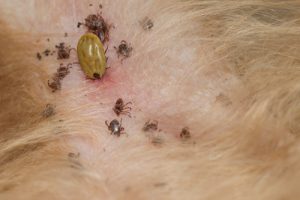Insect bites in dogs are a very common problem and can happen at any time of the year, though they mostly tend to occur in the warmer months. Dogs can be bitten by a variety of bugs, including ants, midges and flies. Insect bites can happen to dogs of any age but tend to be more common in young, inquisitive dogs.
Some insects, such as ticks, can spread disease, so it’s best to use parasite preventatives when your dog is at risk. Most cases of insect bites resolve without treatment. Allergic reactions to bites can be serious but these are luckily rare. Bites around the mouth and neck can lead to more severe symptoms. Seek advice from a vet if your dog has had an insect bite.
Overview
What are insect bites in dogs?
Insect bites in dogs are usually caused by bugs they come across when out on walks, but bites can also happen at home.
- Bugs such as ants, midges, mosquitoes, flies, ticks, and even spiders can bite dogs
- Insect bites tend to be most common around the head and limbs of dogs
- The reaction comes from the saliva or venom from the insect
- Insect bites in dogs are common in spring, summer and autumn
- Insects such as ticks and fleas can spread disease

- Ticks on the skin of a dog
Most cases of insect bites can be treated at home. Our Joii vets are available 24 hours a day if you have any questions about insect bites in dogs.
Symptoms
Symptoms of insect bites in dogs
The most common signs of insect bites in dogs include:
- Swelling and red skin: usually localised to the area of the bite
- Hives: areas of soft, raised skin
- Sudden licking or biting at an area, often excessively
- Limping, or holding up a paw

- Hives on the skin of a dog
In rare cases, dogs can develop a life-threatening allergic reaction to an insect bite, called anaphylaxis. This usually happens within 20-30 minutes of a bite, but it can also occur days later. The symptoms of this include:
- Excessive drooling
- Sudden facial swelling
- Vomiting
- Difficulty breathing
- Collapse
If your dog develops these symptoms, they need to be seen by a vet immediately.
Some insects can spread diseases such as Lyme disease and tapeworm. The symptoms of these diseases are covered in the articles. Find out more by following the links.
Risk
Are some dogs more at risk of insect bites?
Any dog, regardless of age or lifestyle, can develop an insect bite.
- Puppies and young dogs tend to be more inquisitive, leading to a higher risk of insect bites
- Dogs with allergies can be at a higher risk of a more severe reaction to an insect bite
Spread of disease through insect bites in dogs
- Ticks can spread Lyme disease, Babesia and others.
- Fleas can spread tapeworm and a bacteria called Bartonella. Flea bites can also trigger an allergic response called flea allergy dermatitis.
- If you take your dog abroad, they can be at risk of bites from sandflies that spread Leishmania and mosquitoes that spread heartworm.
In rare cases, it’s thought that insect bites can lead to a condition called Eosinophilic Furunculosis. This is a deep infection of the hair follicles and usually affects the nose. Symptoms can progress quickly but the condition responds well to a course of anti-inflammatory medication.
Diagnosis
How are insect bites diagnosed in dogs?
As most insect bites resolve without treatment, diagnosis is usually not necessary. If the skin is not healing, your vet may take a swab, FNA or biopsy of the affected area.
Blood and urine tests are usually needed in cases of severe allergic reactions.
Vet treatment
What’s the treatment for insect bites in dogs?
Most insect bites resolve without treatment. However, some dogs may react more severely and will benefit from:
- Anti-inflammatory or anti-histamine medication for dogs that are itchy or uncomfortable
- Antibiotics for secondary infection
Treatment for severe allergic reactions is more intensive and usually includes hospitalisation, fluids, and oxygen therapy.
Home treatment
How to look after a dog with insect bites at home
Most insect bite reactions can be treated at home, unless the symptoms are severe.
- If there is a tick, remove it as soon as possible. Get help if you are unsure how to do this correctly.
- Use a cold compress for 5-10 minutes on the affected area of skin to reduce swelling. You can use an ice-pack or frozen veg for this; just make sure to wrap it in a towel before using it on your dog’s skin.
- Prevent your dog from licking or biting – self-trauma can lead to a skin infection
- Monitor your dog for any signs of a severe reaction
- Make sure they are able to eat and drink as normal. Softening the food can help if the bite is around the mouth area
- Avoid using any creams or solutions on the bite unless you’ve been advised to do so by a veterinarian
Our Joii vets are available 24 hours a day. Call us for advice if your dog has an insect bite.
Prevention
Tips on how to prevent insect bites in dogs
Insect bites from ants and flies can be difficult to prevent and bites from these bugs usually self-resolve. It’s more important to prevent bites from disease-spreading insects such as ticks.
- Regularly use vet-approved parasite preventative against fleas and ticks
- Avoid areas where ticks are common in Spring and Summer
Is my family at risk of catching insect bites from dogs?
Though they don’t tend to spread from dogs, humans are also at risk from bites from the same insects, such as ticks and fleas. These insects can carry diseases such as Lyme disease. Speak to your GP for further advice if you have been bitten by an insect.
When to worry
When you should be worried about insect bites in dogs
Seek help from a vet if your dog:
- Is collapsed
- Has severe, sudden-onset vomiting and diarrhoea
- Is drooling excessively
- Is constantly itching and uncomfortable
Call us and speak to one of our Joii vets if:
- You have questions about treating insect bites at home
- You have questions about parasite control in dogs
- Your dog has a mild skin problem








